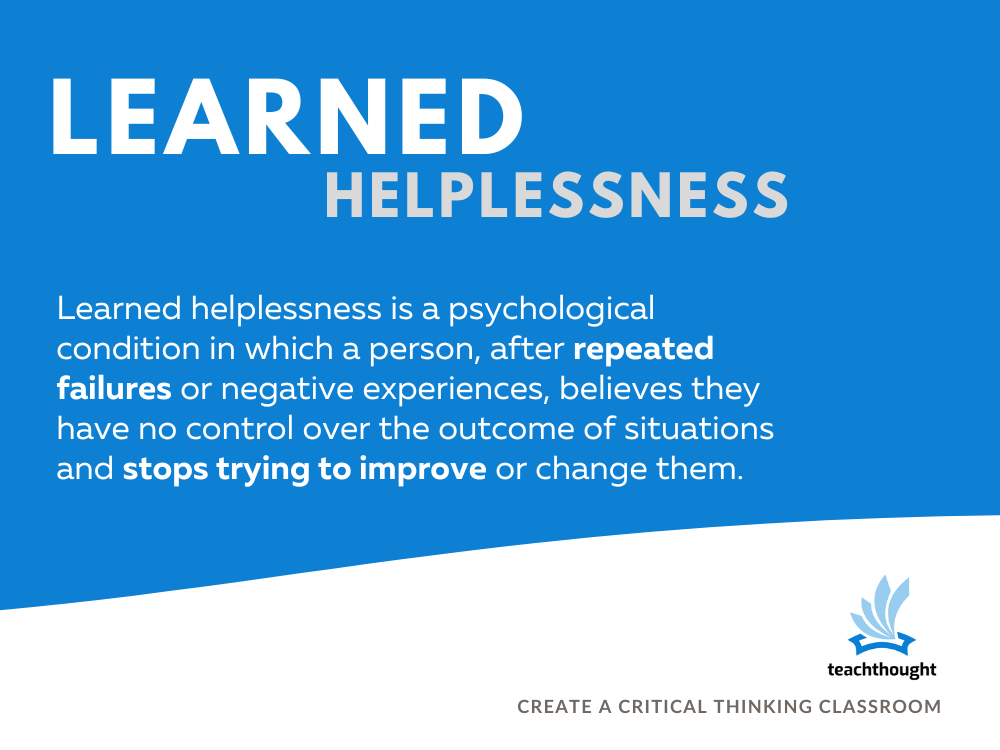by Teaching staff
What is learned helplessness?
identification
Learned helplessness is a psychological state in which, after repeated failure or negative experiences, a person believes that he or she has no control over the outcome of situations and stops trying to improve or change them.
Here is an example of learned helplessness in the classroom.
trainer: Teenagers' biggest fear, written in this text, is not fitting in. Jesse, you talked about acceptance. Now, to understand how this happens, what it looks like, and what it feels like, we're going to do an activity. This is your business, not meant to tax you, these are easy tasks. This is just to give you a feel for what we are going to cover.
Everyone, if you will, take out a short piece of paper. I'm going to deal these cards, keeping them face down. Please do not write to anyone on this; Write on your own paper
Does everyone have one? Now, if you want, just execute them one by one. I'll tell you when you do it.
See also What is cognitive load theory?
trainer: Everyone, turn the paper over and do your own thing. This doesn't mean it has to be difficult. This is an anagram, just do the first word only. Go ahead and solve it. An anagram is where you rearrange the letters to make a word.
Once you're done, I want to see your hand raised. Keep going and we'll wait
Keep your hands up, please. Just do number one don't keep going.
trainer: Okay, let's move on to number two. Don't worry about number one. Go to the second number and solve it. Again, when you're done, raise your hand.
Well, hands down everyone. We're going to go ahead and do number three. For the third number, rearrange the letters, and once done, raise your hand.
Here's what you need to know: You're given two different lists. This side of the room was given three words. The left side of the room was given these words: “Bat” – what would the word be? The second word was “lemon” – what's the word, Brian?
See also 8 of the most important critical thinking skills
Brian: “Watermelon.”
trainer: correct. They were easy words. But here's the trick: both sides of the room were given the same third word, “sinorama,” which is an anagram of “American.” However, the first two words I said on this side of the room were not solvable, they were mission impossible.
I'm sorry about that, but that's why we do it. I was able to induce something called “learned helplessness” on the left side of the room, very easily, in about five minutes. I want you to think about what happened to you, on the left side of the room, when you saw the right side of the room raise their hand because they completed the task.
What happened to you during that period? Jori?
Gauri: I felt stupid.
trainer: I felt stupid. Okay. What's next?
For Joe: I felt rushed.
trainer: I felt rushed. Joel?
For Joe: I was even more confused.
trainer: I was even more confused because they had already solved the problem and you were still struggling. Chelsea?
Chelsea: I felt frustrated.
trainer: frustrated. What happened when you reached the third word? Because I'm here to tell you, this side of the room isn't any smarter than this side. It was a random assignment. So why did I have more difficulty with the third word, which was the same word? Brian?
Brian: My confidence has been shot.
trainer: exactly. What I encountered was a term called “learned helplessness.” How many of you have heard this term before?
trainer: The term “learned helplessness” is often used in academic literature. Gauri, do you know what that means?
Gauri: Basically, they fail once or can't do something once, and then they apply that to everything in the future. So all future missions become skewed because of that.
trainer: exactly. This is what I want everyone to understand. It is usually only used in academic research, and you will see it in educational psychology books, and in textbooks. But I will challenge us to think about how learned helplessness applies to the social landscape. Can someone give me an example of how this might look? Tasha?
Tasha: It's like if a guy asks a girl out and gets rejected, he won't keep trying. He just stops asking.
trainer: This is correct. Now, I want to think about the girls. We've talked about Reviving Ophelia here. Think about how this applies to friendships. Can learned helplessness be induced in friendships? It's hard to make and maintain friendships, it's a difficult process.
If a girl once sacrificed her morals to gain the approval of her friends, or a guy, she's more likely to keep doing it, right?
trainer: I'll put this straight: If Carl was victimized once in elementary school, would he be more likely to defend himself the next time?
students: no.
trainer: What will happen next time? What next? What we know – and this is what we've learned – is that girls are exposed to cultural pressures to be quiet. Girls are subjected to cultural pressure that prevents them from being angry and not using their voices. So, if someone is victimized once—if Alison is victimized once—we can take the same concept of learned helplessness and apply it to social relationships.
So, the moral of the story is that it's important for girls to practice dealing with failure. Because our instinctive reaction, when we fail, is to stop working. When you close down, you don't open yourself up to learning new ways of relating.
This version breaks down speakers, clarifies transitions, and adds punctuation to make the flow clearer. Do you want any other modifications?
Full transcript provided by YouTube

